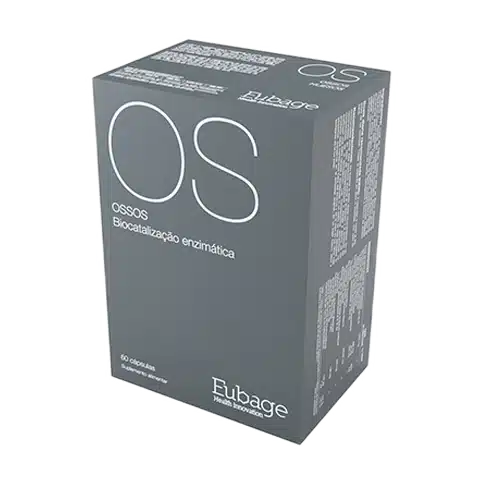Sold out
OS Ossos 60caps - Eubage
€20,53 EUR
Unit price
/
Unavailable
OS Ossos 60caps - Eubage is backordered and will ship as soon as it is back in stock.
Description
Description
OS Ossos 60caps - Eubage
Osteoporosis affects one in four women and one in eight men. Progesterone stimulates the proliferation of osteoblasts (bone-producing cells), whereas estrogen decreases the proliferation of osteoblasts (cells that destroy obsolete bone tissue).
As menopause approaches, natural progesterone production decreases relative to estrogen production, resulting in decreased osteoblast activity and initiating bone loss. Osteoclast activity also increases due to increased organic acidity, resulting in decreased calcium fixation in bone tissue.
Fossilized Calcium Coral (inert, uncontaminated coral collected from the pure waters of Okinawa, in accordance with environmental sustainability) is iodine-free and also contains magnesium and trace elements in a highly assimilable form. It is considered one of the safest and most assimilable forms of calcium.
The structure of the coral exoskeleton is similar to the spongy layer of human bone.
Calcium Coral is osteoconductive and biodegradable. After 1979, its exoskeleton was recognized as a base material for certain bone grafts. This substance is as biocompatible as the human body.
A balanced blood pH is essential for the retention of minerals and trace elements in our bodies. By contributing to acid-base rebalancing, Coral Calcium provides calcium (40% of its content), other minerals, and ionic trace elements found in seawater. They have the effect of: •Dispensing with the conversion phase carried out by the body.
• Promote better and faster bioavailability.
• Have a regulatory role in acid-base balance.
Among the trace elements in Coral Calcium, we highlight:
• Strontium (Sr) which exerts a protective action on ossification mechanisms and increases mineralization.
• Fluorine (F) which increases bone formation by direct effect on the proliferation of osteoblast stem cells.
Diosgenin is a phytoprogestogenic saponin from yam (Dioscorea oppositae) that stimulates ossification and strengthens bone density by participating in the production of osteoblasts (osteoporosis). It is a lipophilic antioxidant that contributes to the proper transformation of dietary sterols, which are a source of endogenous steroid hormones.
Isoflavones, especially irilone and pratensein, phytoestrogens in Red Clover (Trifolium pratense), maintain bone density and mineral content (related to osteoporosis). They regulate menstruation, balance vaginal pH levels, and prevent cardiovascular problems.
Phytonadione, known as Vitamin K, is associated with the carboxylation of certain glutamate protein residues, which form gamma-carboxyglutamate residues, and are essential for calcium fixation and the biological activity of gamma-carboxyglutamate proteins in the processes of regulating bone metabolism.
The natural silicon in Bamboo (Bambusa arundinacae) is a bone recalcifier that is involved in the balanced synthesis of chondroblasts and in increasing the absorption capacity of Calcium and Phosphorus.
Vitamin D3 (Cholecalciferol) is both a vitamin and a prohormone. Therefore, this substance plays an essential role in calcium metabolism (in Latin, "Calciferol" means "the one who brings calcium"):
• Regulates serum calcium levels.
• Ensures the transport of calcium and its fixation in the bone structure.
• Contributes to the maintenance of plasma calcium and phosphorus concentrations. • Improves intestinal calcium absorption.
Vitamin D3 minimizes the elimination of calcium through urine.
60 capsules
As menopause approaches, natural progesterone production decreases relative to estrogen production, resulting in decreased osteoblast activity and initiating bone loss. Osteoclast activity also increases due to increased organic acidity, resulting in decreased calcium fixation in bone tissue.
Fossilized Calcium Coral (inert, uncontaminated coral collected from the pure waters of Okinawa, in accordance with environmental sustainability) is iodine-free and also contains magnesium and trace elements in a highly assimilable form. It is considered one of the safest and most assimilable forms of calcium.
The structure of the coral exoskeleton is similar to the spongy layer of human bone.
Calcium Coral is osteoconductive and biodegradable. After 1979, its exoskeleton was recognized as a base material for certain bone grafts. This substance is as biocompatible as the human body.
A balanced blood pH is essential for the retention of minerals and trace elements in our bodies. By contributing to acid-base rebalancing, Coral Calcium provides calcium (40% of its content), other minerals, and ionic trace elements found in seawater. They have the effect of: •Dispensing with the conversion phase carried out by the body.
• Promote better and faster bioavailability.
• Have a regulatory role in acid-base balance.
Among the trace elements in Coral Calcium, we highlight:
• Strontium (Sr) which exerts a protective action on ossification mechanisms and increases mineralization.
• Fluorine (F) which increases bone formation by direct effect on the proliferation of osteoblast stem cells.
Diosgenin is a phytoprogestogenic saponin from yam (Dioscorea oppositae) that stimulates ossification and strengthens bone density by participating in the production of osteoblasts (osteoporosis). It is a lipophilic antioxidant that contributes to the proper transformation of dietary sterols, which are a source of endogenous steroid hormones.
Isoflavones, especially irilone and pratensein, phytoestrogens in Red Clover (Trifolium pratense), maintain bone density and mineral content (related to osteoporosis). They regulate menstruation, balance vaginal pH levels, and prevent cardiovascular problems.
Phytonadione, known as Vitamin K, is associated with the carboxylation of certain glutamate protein residues, which form gamma-carboxyglutamate residues, and are essential for calcium fixation and the biological activity of gamma-carboxyglutamate proteins in the processes of regulating bone metabolism.
The natural silicon in Bamboo (Bambusa arundinacae) is a bone recalcifier that is involved in the balanced synthesis of chondroblasts and in increasing the absorption capacity of Calcium and Phosphorus.
Vitamin D3 (Cholecalciferol) is both a vitamin and a prohormone. Therefore, this substance plays an essential role in calcium metabolism (in Latin, "Calciferol" means "the one who brings calcium"):
• Regulates serum calcium levels.
• Ensures the transport of calcium and its fixation in the bone structure.
• Contributes to the maintenance of plasma calcium and phosphorus concentrations. • Improves intestinal calcium absorption.
Vitamin D3 minimizes the elimination of calcium through urine.
60 capsules



